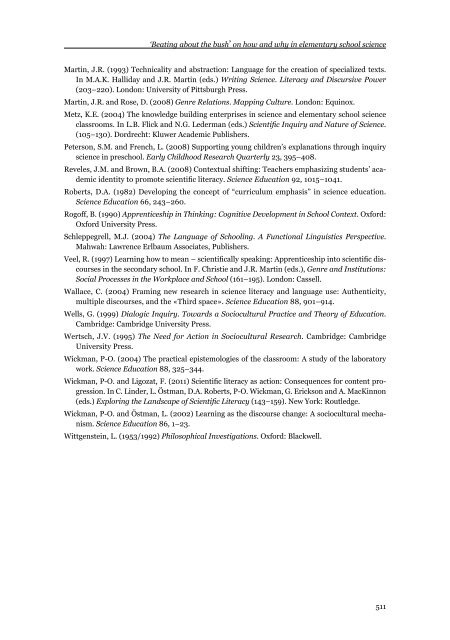Download issue - Lärarutbildning - Umeå universitet
Download issue - Lärarutbildning - Umeå universitet
Download issue - Lärarutbildning - Umeå universitet
You also want an ePaper? Increase the reach of your titles
YUMPU automatically turns print PDFs into web optimized ePapers that Google loves.
‘Beating about the bush’ on how and why in elementary school science<br />
Martin, J.R. (1993) Technicality and abstraction: Language for the creation of specialized texts.<br />
In M.A.K. Halliday and J.R. Martin (eds.) Writing Science. Literacy and Discursive Power<br />
(203–220). London: University of Pittsburgh Press.<br />
Martin, J.R. and Rose, D. (2008) Genre Relations. Mapping Culture. London: Equinox.<br />
Metz, K.E. (2004) The knowledge building enterprises in science and elementary school science<br />
classrooms. In L.B. Flick and N.G. Lederman (eds.) Scientific Inquiry and Nature of Science.<br />
(105–130). Dordrecht: Kluwer Academic Publishers.<br />
Peterson, S.M. and French, L. (2008) Supporting young children’s explanations through inquiry<br />
science in preschool. Early Childhood Research Quarterly 23, 395–408.<br />
Reveles, J.M. and Brown, B.A. (2008) Contextual shifting: Teachers emphasizing students’ academic<br />
identity to promote scientific literacy. Science Education 92, 1015–1041.<br />
Roberts, D.A. (1982) Developing the concept of “curriculum emphasis” in science education.<br />
Science Education 66, 243–260.<br />
Rogoff, B. (1990) Apprenticeship in Thinking: Cognitive Development in School Context. Oxford:<br />
Oxford University Press.<br />
Schleppegrell, M.J. (2004) The Language of Schooling. A Functional Linguistics Perspective.<br />
Mahwah: Lawrence Erlbaum Associates, Publishers.<br />
Veel, R. (1997) Learning how to mean – scientifically speaking: Apprenticeship into scientific discourses<br />
in the secondary school. In F. Christie and J.R. Martin (eds.), Genre and Institutions:<br />
Social Processes in the Workplace and School (161–195). London: Cassell.<br />
Wallace, C. (2004) Framing new research in science literacy and language use: Authenticity,<br />
multiple discourses, and the «Third space». Science Education 88, 901–914.<br />
Wells, G. (1999) Dialogic Inquiry. Towards a Sociocultural Practice and Theory of Education.<br />
Cambridge: Cambridge University Press.<br />
Wertsch, J.V. (1995) The Need for Action in Sociocultural Research. Cambridge: Cambridge<br />
University Press.<br />
Wickman, P-O. (2004) The practical epistemologies of the classroom: A study of the laboratory<br />
work. Science Education 88, 325–344.<br />
Wickman, P-O. and Ligozat, F. (2011) Scientific literacy as action: Consequences for content progression.<br />
In C. Linder, L. Östman, D.A. Roberts, P-O. Wickman, G. Erickson and A. MacKinnon<br />
(eds.) Exploring the Landscape of Scientific Literacy (143–159). New York: Routledge.<br />
Wickman, P-O. and Östman, L. (2002) Learning as the discourse change: A sociocultural mechanism.<br />
Science Education 86, 1–23.<br />
Wittgenstein, L. (1953/1992) Philosophical Investigations. Oxford: Blackwell.<br />
511

















